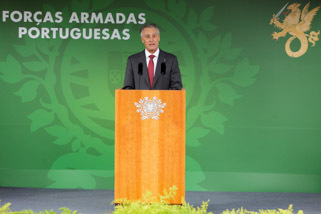

Mister Speaker,
Excellency,
Having received, to be enacted as organic legislation, Parliamentary Decree No. 292/X, which introduces the first alteration to Law No. 6/94, dated 7 April (State Secret), and regulates the access of Parliament to documents and information classified as State secrets, I have decided, in the terms of article No. 136 of the Constitution, not to enact that bill, based on the following premises:
1 – In our legal system, the State secret covers documents and information essential for the preservation of national independence, of State unity and integrity and its internal and external security.
State secret includes, specifically, the strategies to be adopted by the Country in its relations with other States or international organizations, the operability of the Armed Forces and of the security services and forces, and matters regarding trade, industrial, scientific, technical or financial issues which concern the preparation of the State’s military defence.
It is thus a number of information issues which belong in the essential nucleus that safeguards the fundamental values and interests of the State.
2 – In these terms, and considering the nature of the matter, the determination of the juridical regime of the State secret demands that the lawmaker exerts special caution and a high sense of responsibility, cautiously weighing all the consequences that may derive from his intervention.
The intervention of the lawmaker must consider very clearly the institutional architecture of the State, such as established in the Constitution of the Portuguese Republic, in order to avoid conflicts or tensions amongst sovereign bodies and between these and a very restricted number of other bodies which, in the terms of the law, are competent to determine security classifications.
3 – Notwithstanding the merits of some of the changes now chosen, the bill in question contains legal solutions which would appear harmful to a salutary connection between sovereign bodies and for the interdependence of the powers of the State, as well as for the inherent safeguard of the interests that the State secret aims to protect, and goes so far as to consider means of conditioning or constraining the exercise of powers by the several sovereign bodies which are evidently not acceptable.
4 – The legislation currently in force attributes the competence to declassify documents to the body which definitely classified them. This attribution of competence aims to guarantee the substantive firmness of the decision to classify, as well as the balance of powers between sovereign bodies in such a sensitive issue.
In effect, the classification of a document or information as a State secret derives from the assessment of each titular head of a sovereign body as to its relevance towards the protection of national values and interests: an assessment of political content that considers various components, from the timing of the opportunity for secrecy to the connection of reserved information with other issues. Thus the decision to declassify a document must necessarily be closely connected with the decision that led to its classification.
The new text introduced by the bill for No. 2 of article No. 4 of the Law on State secrets, although maintaining the rule that the competence to declassify is invested in the body which definitely classified it, opens an exception when it establishes that such competence be exerted “(...) without prejudice to the provisions of item b) of No. 4 of article No. 13”.
It happens that this rule confers upon the new parliamentary body – although maintaining its prior designation (Committee for the Supervision of State Secrets) –the power to declassify any information or documents subject to State secret, if such should have been omitted by the body which in principle is competent to do so, in the following cases:
i) Expiry of period for keeping or revising classification;
ii) Surcease of the basic reasons for classification of the same act as liable to be comprised as a State secret.
To attribute to a body alien to the act of classifying the ability to determine declassifying, knowing that this body is not aware of and did not weigh all the motives that led to its being considered as reserved, seems harmful for the safeguard of the State secret itself, that is, for the superior national interests.
In addition – and this is crucially relevant – since classifying documents is carried out in connection with the exercise of the inherent duties of each sovereign body, this exercise would become deeply conditioned, placing at risk, not just the inter-institutional relationships of the bodies of State, but the way in which each sovereign body acts in carrying out its own competences.
If, for instance, the Government decides to classify as secret the information relative to negotiations with a certain foreign State, with prior knowledge that the secret may be spurned at any time, its margin for acts of foreign policy will be seriously compromised, be it in the relations with that specific State, or with other States or international organizations. In especially sensitive fields, such as foreign, defence and security policies, the necessary freedom of action of high State echelons could be disproportionately affected, as well as serious effects resulting for international cooperation in matters of fighting new global threats, such as organized crime or transnational terrorism, and even commitments already undertaken at this level by the Portuguese State could come under threat.
5 – In the terms of the provisions on No. 1 of article No. 3, No. 2 of article No.4 and No. 1 of article No. 2 of Law No. 6/94, the President of the Republic is also duty bound to determine the classifying and declassifying of information and documents relative to the exercise of his powers, awareness of which by non-authorized persons could place at risk or cause damages to national independence and to the State’s unity, integrity and security.
This duty specifically derives from his status as Supreme Commander of the Armed Forces and as the holder of the competence to preside at other constitutional bodies such as the Council of State and the Superior Council for National Defence.
Nevertheless, the new text proposed for the final part of item b) of No. 4 of article No. 13 of Law No. 6/94, allows that a free judgement on the merit of the decision, pronounced by that Parliamentary body and favourable to declassifying information and documents, overlaps the judgement of the President of the Republic which considers that certain information and documents classified by him should continue subject to State secret.
Equally, in terms of the right of access by Parliament to classified documents, foreseen in the now added article No. 9-A, Parliament will be competent to access documents classified by the President of the Republic, which worsens the overlapping situation.
Such overlapping, foreseen in the above mentioned rules, is that much alarming as the concentration is clear of Parliamentary powers relative to State secrets, especially since the President of the Republic is not politically responsible to that sovereign body.
6 – Added to the above, this bill introduces a significant change as to the nature of the Committee for the Supervision of State Secrets, the competent body to watch over the compliance with this legislation.
The new text of article No. 13 of Law No. 6/94, as provided in article No. 1 of Decree No. 292/X, establishes the alteration of the nature of the Committee, which loses its status of an independent body, and is now converted to a “Parliamentary body”.
It should be recalled here that the Constitutional Court made very clear, in its Judgement No. 458/93, the importance of the independence of the supervising body for the preservation of a salutary inter-institutional relationship, stating: «given its status as an independent body carrying out its duties under the aegis of Parliament, its opinions must not place at issue the constitutional relationships between sovereign bodies».
As such, since Parliament has relevant duties regarding State secrets – strengthened anyway by this alteration, either with respect to its access to classified documents, or to the powers of the Speaker – emphasis must be placed on the organic confusion which would result from the accumulated duties of Parliament, simultaneously a supervising and a supervised body.
7 – A clear example of this concentration results specifically from the imposition on the classifying bodies to supply the supervising Committee with the data referred in item a) of No. 4 of article No. 13, aiming to organize «a record of all the information and documents classified as State secrets, based upon the data supplied by bodies empowered to do so, which will include identifying references of each one, and general information on the respective topic and date and bases for its being classified».
This would have the result, for instance, that at any time the President of the Republic, the Speaker of Parliament, the Prime Minister or a Minister, in the exercise of their duties, decided to attribute a security classification to information or to a document, they would be bound to advise such a fact, with extremely precise details, to the Committee for the Supervision of State Secrets, in order that this body should organize a «secrets’ record». This, in the context of a system in which there is no obligation for the author of security classification to advise such a fact to the remaining competent bodies. That is, the Minister for National Defence is not bound to advise his peers, or even the Supreme Commander of the Armed Forces, whenever he classifies a document as a State secret. However, in line with Decree No. 292/X, he would be bound to advise the supervising committee, in order that this body should organize and update the record referred to in item a) of No. 4 of article No. 13.
The conclusion may thus be arrived at, as regards State secrets, that a parliamentary body with three members, while centralizing data received, could be better informed than any sovereign body over essential issues for national independence or for the internal and external security of the Republic.
8 – This legislation is that much incomprehensible when, as a result of the provisions of new article No. 9-A, Parliamentary powers are greatly expanded with respect to access of classified documents, now allowing it free decision not just as regards access to all classified information and documents, but as to the opportunity of their being sent.
The opening up of these new access rules, associated with the change in the nature of the supervising committee, which loses, as outlined above, its characteristics of independence, leads to a clear concentration in Parliament of the duties of classifying, of access to information, and of resolving, without appeal, the complaints put forward and the supervision of State secrets.
Without placing at issue the access of Parliament to classified documents – within the framework of the constitutionally imposed restrictions in this matter – it is important that the referred concentration should not result in the diminishing of powers of the remaining sovereign bodies, thus affecting the principle of separation and interdependence of powers.
As such, in the terms of article No. 136 of the Constitution, I have decided to return to Parliament, without enactment, Parliamentary Decree No. 292/X, which introduces the first alteration to Law No. 6/94, dated 7 April (State Secret) and rules the access of Parliament to documents and information classified as State secrets.
With highest regards,
Palace of Belém, 5 July 2009
THE PRESIDENT OF THE REPUBLIC
Aníbal Cavaco Silva
© 2006-2016 Presidency of the Portuguese Republic
You have gained access to the records of the Official Site of the Presidency of the Republic from 9 March 2006 to 9 March 2016.
The contents available here were entered in the site during the 10 year period covering the two mandates of President of the Republic Aníbal Cavaco Silva.